EDITOR’S NOTE: All the names of cancer patients in the undercover parts of this story have been concealed as a mark of honour for their struggles and respect for their privacy. An undercover method was unavoidable, as it was the only way to ascertain the true quality of healthcare available to them in federal hospitals. TheCable confirmed that the journalist is in possession of video and audio evidence of ALL the findings of this story.
For a futile month in 2017 and two fruitful ones in 2018, ‘FISAYO SOYOMBO, Editor of the ICIR, was accompanied by a private oncologist in going undercover at two leading teaching hospitals in the country to ascertain the true quality of healthcare available to cancer patients. Together, they discover how the lack of functioning radiotherapy machines is impeding the treatment of numerous cancer patients and aiding the spread of the disease from a point in their bodies to others, leaving many of them stranded midway through their treatment and their families resorting to lobbying hospital officials. This is also a celebration of love — how cancer patients are fighting to see every new day by merely seeking to repay the care and faith and sacrifice of their lovers.
This is one of the most intense, riveting love stories you will ever read. Contrary to what you may be thinking already, it isn’t set in the Hotel President Wilson in Geneva, Switzerland — the world’s most expensive hotel — or in the famous Burj Al Arab in Dubai, the third tallest and fourth largest hotel in the world. It isn’t set in Paris, the fabled ‘city of love and romance’, either. Instead, this true life story is set in the frenetic city of Lagos, specifically domiciled at the gynecology ward of the Lagos University Teaching hospital (LUTH). Dateline, February 2018.
A dark, beautiful young lady from Edo State — confined to the bed by terminal sickness — writhes in agony. She twitches her right fingers but the rest of the arm is static; it’s swollen and bandaged, the source of enormous pain. She closes her eyes and grits her teeth as though mustering all the strength within her in an attempt to say something to the doctor, but she doesn’t. Weak and helpless, she gives up.
Advertisement
Her boyfriend — a dark, handsome, confident young man from Delta State — cut a forlorn picture. The agony in his eyes is palpable; it is clear he wants to help, but he can’t. He can’t even hold her hands in his; one touch and she’d scream in excruciating pains. Instead, he stares at her in consolation, wearing a sombre look suggesting he would rather bear the pains on her behalf.
THE POWER OF LOVE
Advertisement
One of his girlfriend’s breasts has been cut off; mastectomy is what the doctors call it. It is from there that the cancer raging through her body emanated. In all, she has undergone surgery, chemotherapy, radiotherapy — the three commonest medical solutions to cancer — yet her condition is deteriorating. She is becoming paler, losing weight, now unable to move — because the cancer has so spread round her body that she now suffers from metastatic neuro disease. Also, due to the cancer, she has lymphedema, responsible for the swelling of her eyes and right arm. She has intense chest pains and struggles for breath after weeing. She’s on oxygen as well. And what more? Breasts don’t regenerate; that breast is gone forever. Still, he loves her.
“I love her so much. She was my crush then when we were in Uniben but she used to play hard to get,” he says. “I never knew we would meet again in Lagos.” For the first time in a pain-laden 15 minutes, she blushes, her face lightening up and her lips slowly parting to release such glorious smiles that set one wondering just how pretty she must have been in her healthier days. Love, oh love! Such medicine even to the sick.
They have been dating for roughly six months. After losing track of each other back in Benin, where they both grew up, they met fortuitously on the streets of Lagos in January 2017. She had just undergone surgery at the time; and as the friendship blossomed, she told him she had cancer, and that one of her breasts had been removed.
“Trust me, it wasn’t an issue,” he says of the breast removal. “Even she was shocked [by my reaction] when she told me; I never felt anyway. If you love someone you have to accept them the way they are; it’s the truth. Life goes on. You can’t hold on to that, because it’s not her fault that she has cancer. I have accepted it.”
Advertisement
What he has accepted is often not so easy to deal with. As explained by the external oncologist who joined the journalist in entering the hospital undercover, there are ample examples of husbands who divorced their wives after mastectomy, despite already having kids after several years of marriage. In fact, there are cases of husbands who prevented their wives from undergoing the procedure, despite knowing that retaining the breasts literally meant a death sentence.
One more time she clenches her fists in pain and her man’s face contours into a frown. It’s such an unpleasant sight to behold. For how long will they endure this pain? When will she be strong enough to get out of the hospital and return to her normal life?
“I pity her a lot,” says the undercover doctor. “But I pity her boyfriend more. This lady I see has one year — probably two more — to live. The doctors handling her case must have told her, and I hope she has told her man — because no doctor will. The doctor tells the patient the truth but no one else. There is a doctor-patient confidentiality that forbids the doctor from opening up to anyone else other than the patient.”
BLAME CANCER, BUT BLAME THE HEALTH SYSTEM MORE!
Advertisement
When — or if — she dies, her death will be blamed on cancer, but make no mistake: the Nigerian health system would have been hugely complicit. Her death would have been fast-tracked by the many inadequacies of a comatose public health system. Why?
Advertisement
Last year, she was scheduled to undergo external beam radiotherapy (RT) treatment, ideally delivered by a machine called Linear Accelerator, or Linac for short. All linacs generate high energy x-rays (photons), which are then carefully aimed at the area of the patient’s body being treated by the Consultant Oncologist. First, LUTH’s RT machine is not linac, therefore incapable of producing the maximum result. Two, she was scheduled for 18 courses. But after 10 rounds, the RT machine broke down (in June 2017). Thus marked the end of her radiotherapy treatment — just at the halfway mark. Almost one year on, the machine hasn’t been fixed, neither has a new one been bought.
In any case, there is good reason to doubt the efficacy of those 10 sessions, as she recalls the difficulties faced by patients in the final days of the broken-down machine. “There were serious issues with the machine,” she says. “A lot of people were having complications; some were overdosed, others under-dosed.”
Advertisement
A LETHAL PAUSE
According to the undercover oncologist, the aborted procedure she was undergoing is called ‘adjuvant radiotherapy’, that is radiotherapy done following a debulking surgery (also known as tumor removal surgery).
Advertisement
“The courses are spread out in such a way as to target the remnant metastatic tumour cells,” he explains. “She was placed on 18 courses of radio, spread out over months, in order to deal with the problem cell by cell. So, what happened when the radiotherapy machine spoilt is that you stopped the process of clearing the metastatic cells.”
The implication is that those cells that had not been cleared after the 10 courses would continue giving her symptoms manifesting as pains in parts of the body. “Cancer cells feed on blood, so the person will still look sickly,” he says. That is the best scenario for the luckiest patient.
“But the worst — which is usually the case and which has clearly happened in this case — is that the metastasis continues, which means as the cells around her breasts were being targeted, the metastasis could have gone to the lungs and could have even gone as far as the brain — because the process of spread is through the blood or through the lymph nodes,” he adds. “The patient can start coughing blood because the cancer has gotten to the blood, or you start seeing signs of encephalopathy because it has got to the brain. You see she complained about back pains? It is because the cancer has spread to her back. These are all favourable areas for breast cancer spread; breast cancer likes the brain, the lungs, the bones.”
She is clearly a victim of the system. Unlike most patients who report to the hospital late, she sought medical advice once she noticed a lump in her breast in September 2015. After running a series of tests, she was diagnosed with cancer. She promptly began treatment, staying on chemotherapy for six months before going under the knife in February 2017. This was followed by took two courses of chemo after surgery, before enlisting for the botched radiotherapy treatment.
“I didn’t delay treatment at all,” she says emphatically. “Everything was rapid.”
STRUCK DOWN BY INDUSTRIAL STRIKE
She’s not the only victim of the system, though. Of the dozen others whose stories would be touched in this piece, one decides to bare it all. As he explains, there’s nothing left of his human pride. All of it has been “taken away”.
Now 42, Muhammed Musa was only five years old when his parents noticed a small growth around his right eye. It was small but it wouldn’t leave. Best description to give it: “permanent pimple”. As the years passed, it initially didn’t hurt, neither did it rise in bulge. But as Musa approached adolescence, the pimple began to show that it wouldn’t be left out. Then it began to multiply. From the eyelids, similar sights suddenly began appearing on other parts of his body. Rashes! So his mother thought, and thus she sought native treatment in their Village in Edo State.
In his mid-20s — now a man and now in Lagos — Musa sought medical help. Cancer of the eyelids, the doctors said — with attendant tumours that needed to be removed. This was disturbing news because he couldn’t raise the funds. “None of my people had money, as I come from a really poor family,” he recalls.
However, by 2004, he had managed to raise just enough money to remove the tumour. It was a minor surgery. It looked like he had seen the end of his travails. If only he knew that was just the beginning.
Within two years, the tumour was back — this time on the left eye. He had barely recovered from his huge indebtedness courtesy of the 2004 operation. Musa frantically began job-hunting, hoping to be able to save enough to someday fund a second operation. But no one would employ a sick candidate. “That was how I suffered from 2006 till 2010/2011 when I eventually raised the money needed to remove the tumour,” he says.
AN EYE FOR THE SYSTEM
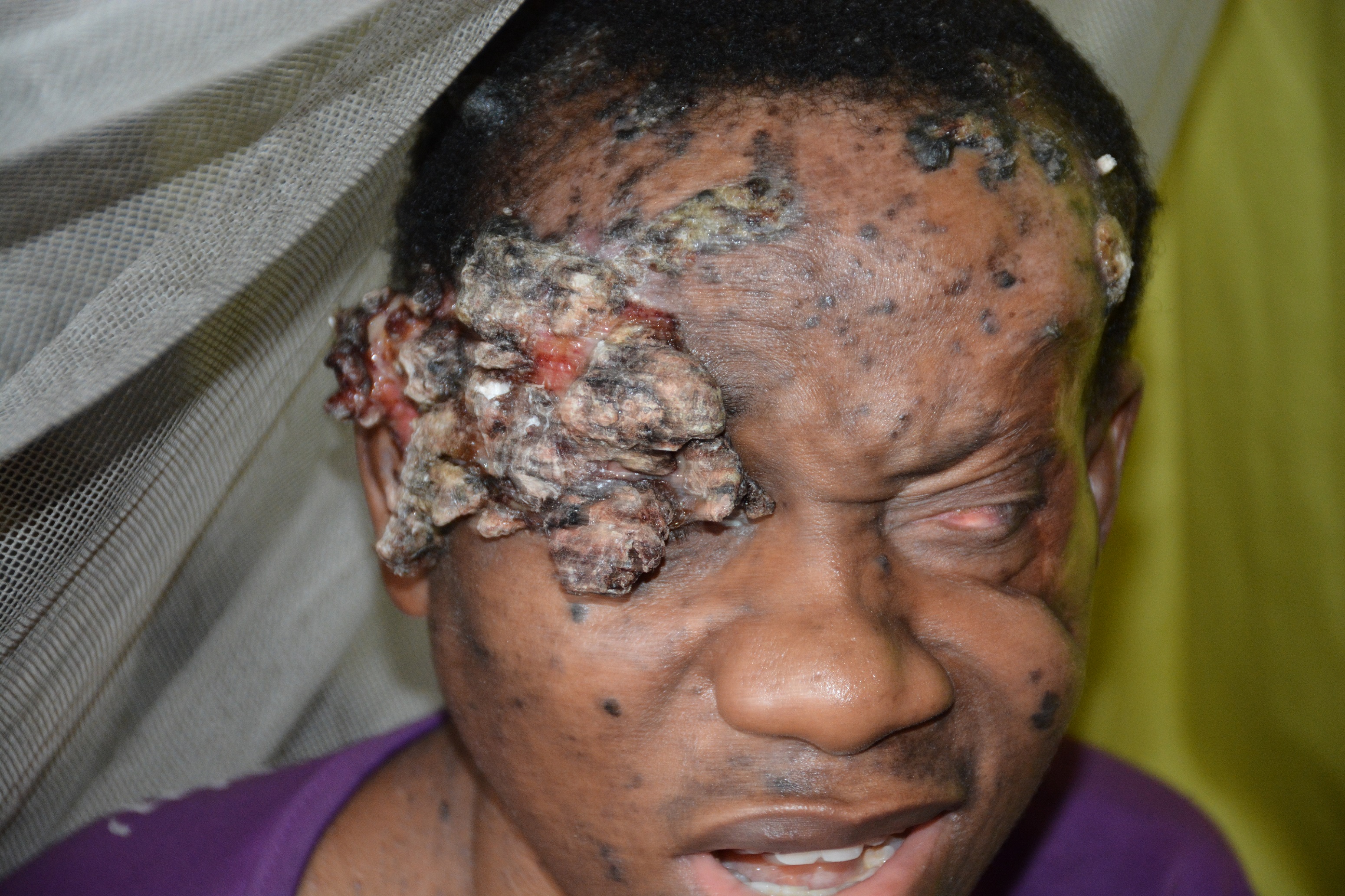
Then something heartbreaking happened. The National Association of Resident Doctors (NARD) embarked on a nationwide industrial action, after a series of warning strikes, to “draw the attention of the Federal Government to the deteriorating state of the health sector and low morale of doctors”. As the action coincided with Musa’s surgery date, he missed a big chance. That was in April 2010. Two more industrial actions followed, and on each occasion, the patients were discharged and no one reached out to them upon resumption of work. In all, Musa waited on the doctors for so many months, “almost a year”. Of course, the cancer wasn’t waiting. It spread so rapidly that it cost Musa his eye.
“When I started visiting the hospital, the tumour was quite sizeable, but not so big to the point where it would have affected my eye,” he says in a teary, regretful tone. “But the tumour became overlarge because of the strike action. The doctors would even admit us preparatory to surgery, but there would be strike so they discharged us each time.”
When the last of the industrial action was eventually called off, LUTH didn’t reach out to him. He was “lucky” that the tumour was giving rise to wounds that needed to be dressed, so he went to a private hospital where the wound was dressed for ₦10,500. Subsequent ones were to cost ₦5,000 per session. He didn’t have the ₦5,000 when the second session was due, so he risked an unsolicited visit to LUTH to see if someone could dress the “painful” wounds. “When I got there I met the doctor, and he said they were looking for someone to send to me, that the strike was over and they wanted to perform the surgery. So they gave me a date: March 14, 2011. But the tumour had grown so large that doctors said he would have to lose his eye.
FORTY-TWO AND STILL SINGLE
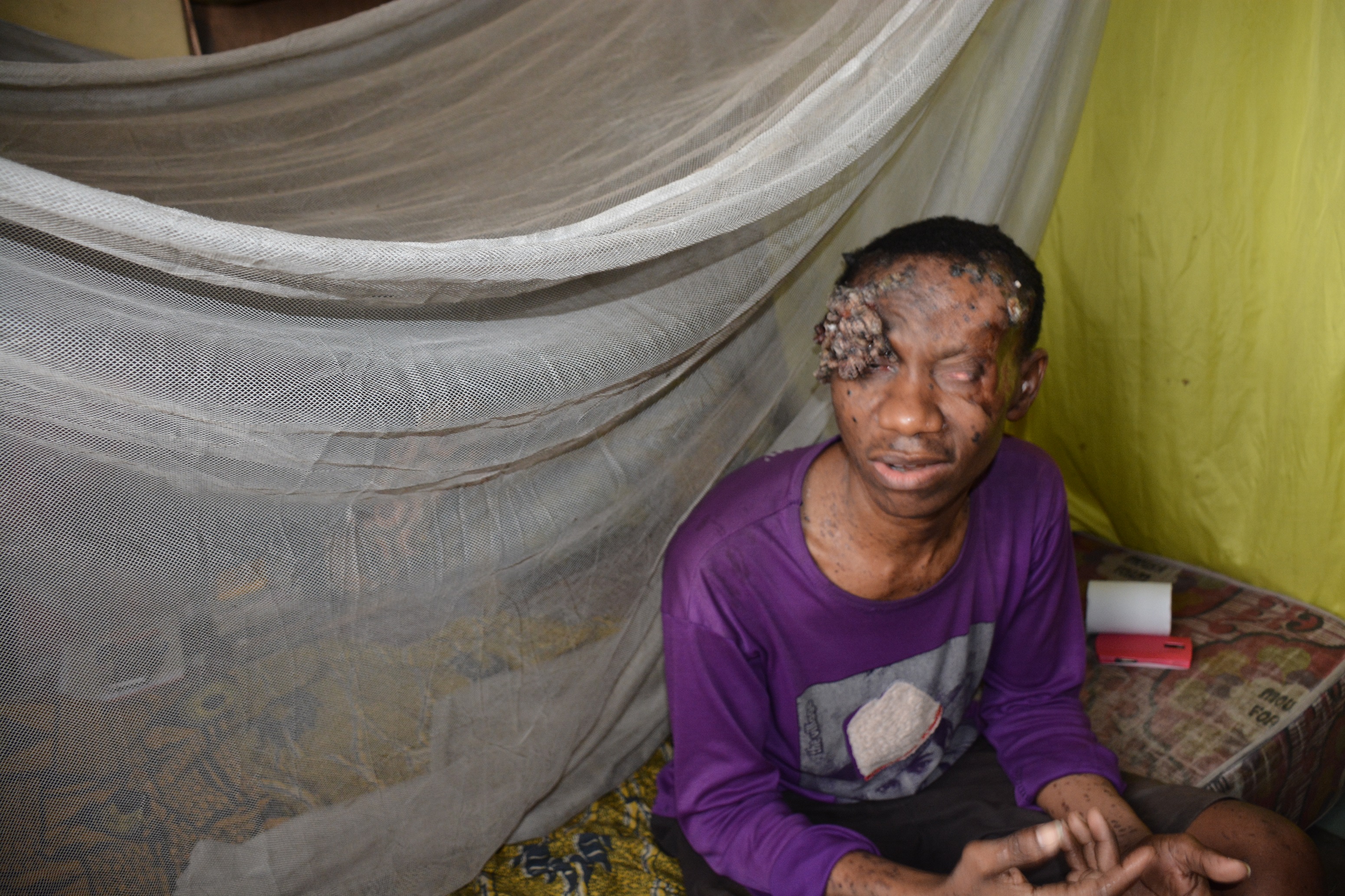
Musa eventually went under the knife, sacrificing his right eye for the decay in the system. One more development: his other eye had become badly affected by the wait; so, not long after the surgery, a tumour began developing there as well. In 2013, he was told another surgery would cost him ₦700,000. Unable to afford it, he opted to try the Lagos State University Teaching Hospital (LASUTH), where he didn’t know more bad news awaited him.
“Because the fees they charged was too much, I went to LASUTH at Ikeja. They said there would be consequences if they performed the surgery. One, the second eye would have to go. My ears would stop working. They would remove all the skin on my head, and use another to cover it. That was in 2013,” he explains, tears coursing down his eyes.
“I told them I couldn’t do it — because the left eye had already gone. If I should lose the right one, who will take care of me? Due to this problem, I am still single at 42. I don’t have a wife; I don’t have a child. So who would take care of me?”
‘I’M DYING BUT I DON’T WANT TO DIE’

Back then in 2013, Indian doctors told him they could remove the tumour and also save his eyes. But it would cost him N3.8million. but to pay that was someone who couldn’t afford N700,000
By August 2016, the bill had risen to N8.5 million. Without a job, someone to take care of him, or even money to feed, Musa is all by himself at home — somewhere in Oshodi — resigned to fate.
“In June 2017, I started experiencing excruciating pains in both legs; they legs swelled up, and at the end of the day, this one burst. You can see the opening,” he says, then gives in to a cough he had be trying hard to suppress.
“I went to Gbagada General Hospital,” he continues, “but they refused to attend to me. They said I should go back to LUTH, being my first clinic. When I got to LUTH, they said there was no available bed for me, and that they would take me to a private hospital: ₦50,000 deposit first, and ₦1million or more if I spent more than 10 days there. Even ₦5000 I didn’t have on me on that day, where was I supposed to get ₦50,000? from”
Musa’s problem is beyond the tumour overshadowing his right eye. To prove this, he removes his shirt and folds up his knickers, revealing spots of rashes and tumours marauding his skin. A thick stench at once rents the air at the penthouse from which the landlord is already threatening to eject him for defaulting on rent.
NO FOOD, NO WATER, FAILING HEALTH
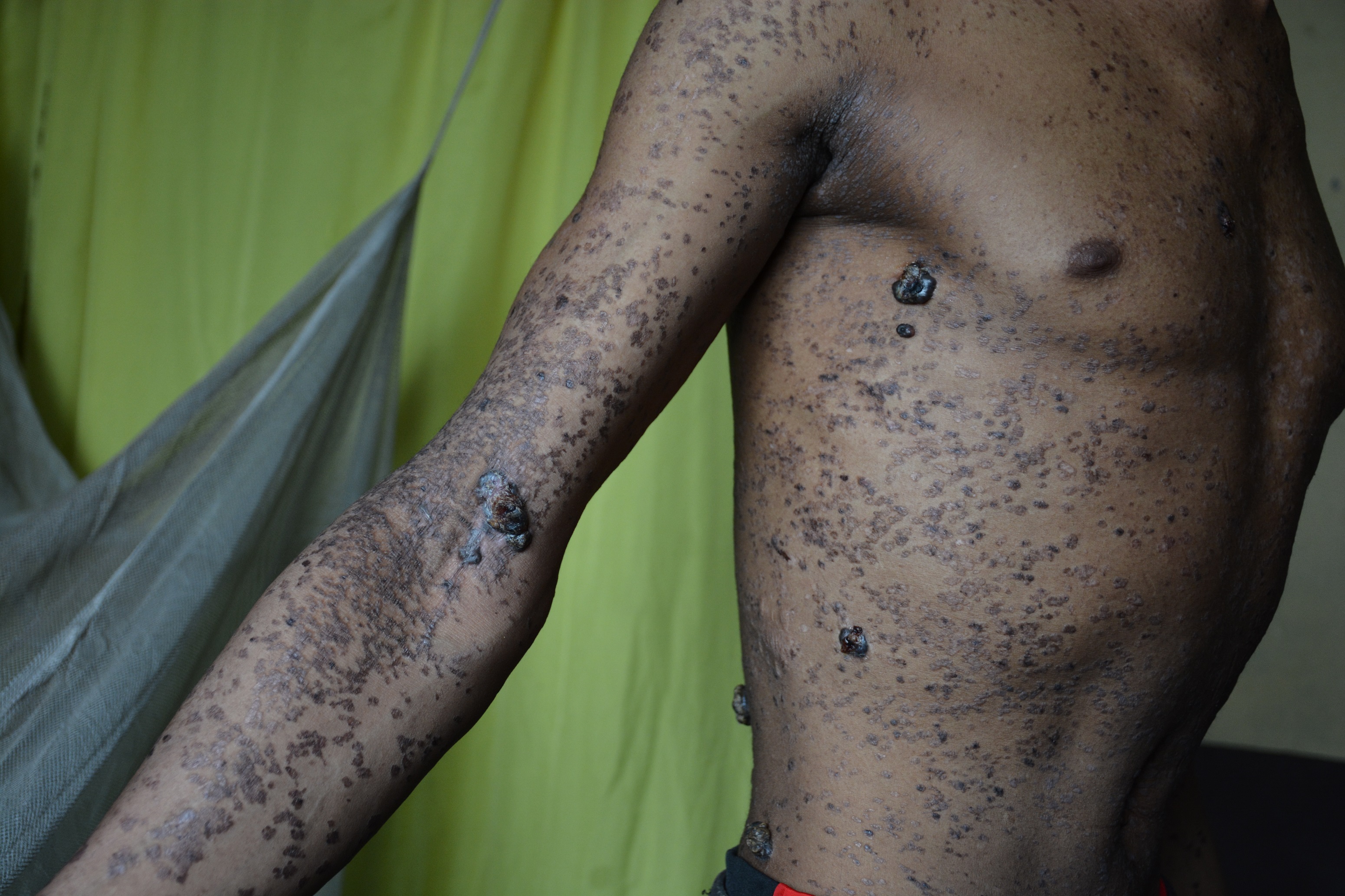
“I’m sorry, my brother, but I have nothing to hide any longer. If I die today, the people who will bury me will get to see the nakedness I’m hiding. Look at me, I’m dying here but I don’t want to die. Please help me,” he says tearfully.
“I’ve run everywhere possible… no one to help. I wrote to the Ministry of Health; I wrote to the Lagos State government. They said they had no funds to assist me. My brother, I swear to God, since yesterday, even sachet water I have not seen to drink.”
Musa did get some help along the way, though. A house officer at LUTH picked interest in his case, and continued sending him money even at the expiration of his housemanship and relocation from Lagos to Ibadan. That doctor is now jobless, and as such, Musa is feeling the heat.
“It is only this doctor that has helped me when capable. But since he lost his job, I have been in a bad situation here. It is only if someone remembers me and decides to visit, maybe one of my mosque members, that I get something to eat.”
The bad news is that it looks his condition may get worse. He knows as much, admitting: “You know, these skin rashes have now started developing tumours; the doctors said they have stayed too long on my body. The only thing they can face is the tumour on my eyes. And when they’re done facing that one, we will be dealing with more tumours from those rashes.”
NO RADIOTHERAPHY IN LAGOS, NO BIOTHERAPY IN ZARIA
“Please help me, please help me,” a 64-year-old woman says in Pidgin English amid fits of cries and screams. “Doctor, abeg make una help me oooooooooo.”
Were the basic cancer treatment procedures in place, this woman would have no business with admission at LUTH’s gynecology ward. By the woman’s account, LUTH referred her to the Ahmadu Bello University Teaching Hospital (ABUTH), Zaria, to undergo biological therapy (biotherapy for short) — a type of treatment that uses substances made from living organisms to treat disease. Biotherapy is considered superior to chemotherapy because chemo drugs can’t differentiate between cancer cells and healthy cells in the body. As a result, chemotherapy causes damage to normal cells, which can result in nausea, fatigue, hair loss and other side effects associated with this type of treatment. Biotherapy, meanwhile, generally makes use of natural, living substances that bolster the immune system’s ability to fight cancer. In addition, some forms of biotherapy prevent specific cancer cells from growing, or even kill them. Compared to other cancer treatments, the side effects of biotherapy are notably low.
After listening to the woman, the undercover doctor explains what the LUTH doctors must have been thinking, in sending the woman to Zaria. “Sometimes, as a doctor, you assess some patients and you see clearly that there is a limit to the external gimmicks that you can make. So you complement with biotherapy.”
Worried by how her two children, both adolescents — one male, the other female — would survive should she die — the woman, a roadside roasted plantain seller at Ojo-Alaba, Lagos, borrowed money and endured a tumultuous road trip to Zaria from Lagos. Without enough money for hotel accommodation, she slept out in the cold during her few days in Zaria. That was in 2016. On arriving the teaching hospital in Zaria, she was told, first, that they were not expecting any patient from LUTH. The LUTH authorities hadn’t pre-contacted them. This could have been sorted out in a matter of days, but the bigger problem was that Zaria’s biotherapy machine had broken down.
“It’s not only Zaria; I know two teaching hospitals in Nigeria with the equipment to carry out biotherapy, but none of them as functioned in the past three years,” the undercover oncologist adds. “In fact, presently, there is no functional biotherapy equipment in any public hospital in Nigeria. Long and short, biotherapy is currently unavailable in Nigeria — and this is a function of equipment, not expertise.”
Ever since, the woman has been frequenting LUTH for drugs, tests and admission. But, on the evidence of current pains, the cancer in her cervix is spreading fast.
‘I DON’T WANT TO DIE… MY CHILDREN ARE STILL IN SCHOOL’
“Since then, I have been constantly complaining, especially regarding my stomach. It’s getting bigger and the pain is so much,” she says, again in tears. “I have spent a lot of money too, and on many scans that cost ₦40,000, ₦30,000 each. There is nothing, including scans and injections, they recommended that I have not done or bought, but my belly is swollen now and won’t return to normal size.”
The woman bursts into another round of please-help-me tears. The stomach aside, her left leg has swollen up. Various scans on the leg have yielded no solution. She is also one of the victims of the breakdown of LUTH’s radiotherapy machine; she had only completed a little more than half of the recommended radiotherapy sessions when the machine broke down in June 2016. Twice — with biotherapy and radiotherapy — this country has failed her. And this is after spending well over N1million on her health. Bear in mind that this is a roadside roasted plantain seller, and that the stomach and leg swellings and pains weren’t there pre-Zaria, when she first reported to LUTH.
“Please help me,” she sobs again, louder this time, as undercover oncologist and doctor make their way out of the ward. “Please, help me. It is the small money I make from my work that I use to send my children to school. I don’t want to run out of funds for their education. I don’t want to die while they’re still in school.”
A DAY AT LUTH’S ONCOLOGY AND RADIOTHERAPHY DEPARTMENT
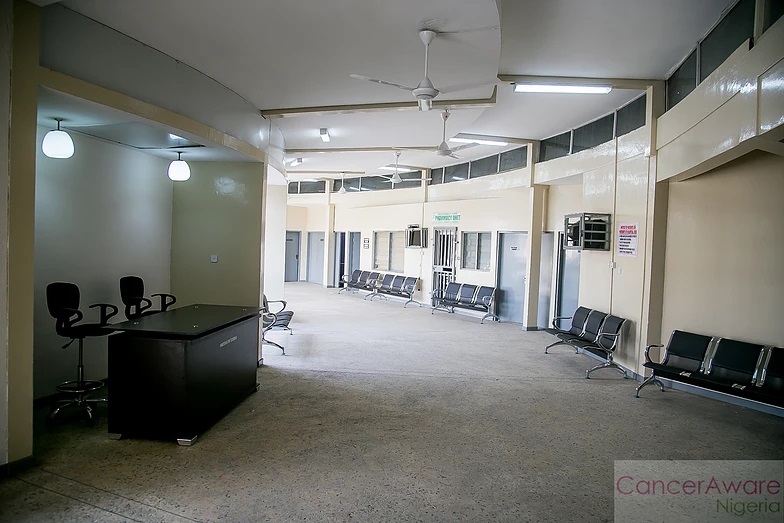
On an average day, the Oncology Department at LUTH is like a tripartite arena. First part, early in the morning, it takes on the semblance of a graveyard. We’re talking 7:00, 7:30, 8:00am — cancer patients, old and young, male and female, are trickling in, some for confirmation of next laboratory tests, some for the highly-dreaded chemotherapy sessions, others for confirmation of surgery dates or for post-surgery evaluation.
The ward is generally quiet at this stage, save when the familiar faces of long-term patients interlock, paving the way for exchange of mild-witted niceties. Globally, cancer is a generally deadly disease. But Nigeria is where the death ratio is highest: 805 of 1,000 cases — or four in five cancer cases — result in death. According to statistics from the World Health Organisation (WHO), over 100,000 Nigerians are diagnosed with cancer annually, with 80,000 of them dying from the disease — an average of 240 Nigerians/day or 10 Nigerians/hour. As if that wasn’t enough, WHO has predicted that Nigeria can expect a 75 per cent increase in cancer-induced death by 2030. Add that to the chaotic and comatose health system and it can be said that in Nigeria, cancer is somewhat a death sentence, the reason the oncology ward usually wears a sombre, gloomy look early in the morning.
Usually, from a few minutes past 8am till 10am or thereabouts, a first-time visitor can be forgiven for thinking he missed his way and ended up in a church! This is the second part, comprising praise and worship, sermon and altar call. Then the third and final part is where the ward looks both like a hospital-cum-market: filling the attendance list, roll call of patients, loud complaints by angry patients.
When the journalist visited the department one Thursday in March, all three scenarios played out. First, the initial silence. But at 8:20am when a nurse comes in and tells the patients ‘Let us pray’, everything changes. After the prayer comes a praise and worship session that begins thus at exactly 8:55am: O se o Jesu/a o ma yin o/o se o Jesu/Olorun ayo wa (Thank you Jesus we will praise you, the source of our joy…). Soon, nurses and patients invite God to their midst to perform miracles, singing: Yahweh/Your name is Yahweh/You are the miracle working God/Your name is Yahweh, and later Come and do your miracle today/Your miracle today….
PRAYERS FOR REPAIR OF RADIOTHERAPY MACHINE
One look at the patients and one could tell they looked more to God for help than to the doctors at LUTH. And it is easy to see why: those of them scheduled for radiotherapy sessions understand that the doctors can do no magic if the government continues ignoring the hospital’s broken-down RT machine. In any case, the nurse leading the session soon touches the matter as praise and worship morphs into full-blown prayers. “Let us continue to pray for Nigeria and for our government,” she charges the patients. “It is our right to have this radiotherapy machine but unfortunately our government is not up to date in this wise. We are optimistic that things will improve very soon, but we must pray so this can happen quickly.”
The end of prayers at 9:22am isn’t it for the day, no. A female doctor — tall, fair and with a thick Igbo accent — takes over. It’s sermon time! It lasts approximately 20 minutes and is followed by the altar call: those who want to surrender their lives to Christ have the chance now. Of course, for a population of people afflicted by a disease that translates to a death sentence in their country, quite a number presented themselves. Who would blame them? Better to hand one’s live to Christ since Nigeria places no value on it, anyway. Altar call ends at exactly 9:49am; time, now, for the day’s main activities.
As the patients watch out for their names to have their moments with the doctor, there is a huge conversation about how the lack of a radiotherapy machine at LUTH was compounding their woes. By the accounts of five patients, private hospitals are taking advantage of the gap.
HELPING PATIENTS SEE DOCTORS IS LUCRATIVE BUSINESS
“I went to Eko Hospital after the breakdown of LUTH’s machine, and I was given a bill of N160,000,” says a slender, light-skinned woman. “But when I presented myself on appointment date, I was told that the cost had risen to N250,000. Apparently, Eko Hospital had become aware of the damage to LUTH’s machine, so they saw an opportunity to make quick money.”
“It’s blood money, I tell you!” another patient yells. “My own problem is that Eko Hospital is crowded these days; it’s so difficult to see the doctors.”
Having devised an underhand way around the challenge, the first patient offers some interesting advice: “There is this boy who lives not so far from the hospital; if you give him N500, he’ll go there around 2 or 3am to write your name on the patients’ list for the day. I can link you to him if you want, but that’s what I do.
“I started doing it since the day my husband and I spotted robbers around Jakande and Lawanson [on Victoria Island] when we left home around 4am because I needed to see the doctor early. We had to stop doing that; we won’t die before death comes.”
Were the boy to do that for 10 patients every day, that’s N5,000 daily — N25,000 at the end of the week.
Their conversation is interrupted by a woman who left her home in Ikorodu at 5am so she could arrive the hospital in time to see the doctor, but has now been told, at 11:06am, that her file is missing.
“What manner of nonsense is this?” the woman, dark, ostensibly in her mid-30s, says. “Can you imagine such utterance? As if I took my file home the last time!”
She returns to the hospital staff after 15 minutes but she is told to “stop disturbing us”. “This people are trying my patience,” she huffs. “I will leave them to their madness and go to my home, after all it is God who takes care of the sick.”
After about an hour of tussle, she is told to see the doctor; the file would be taken care of later.
File disappearances aren’t specific to LUTH. According to a doctor, who asked not to be named because of her close ties to the UCH, such disappearance once cost a patient’s life — indirectly.
“Few years back while working at UCH, I had this patient whom I suspected had breast cancer. But to be 100% sure, I sent her to the lab,” she recalls. “She did the test, but when the time came to collect it, UCH couldn’t find her result. She was told to pay a second time for another test.
“But this woman never came. Instead, her church members convinced her to focus on prayers. Guess what, she eventually died of cancer. If UCH hadn’t lost her test, she would have started treatment fairly early, and maybe she’d still be alive today.”
AT UCH, NO CONNECTION, NO RADIOTHERAPY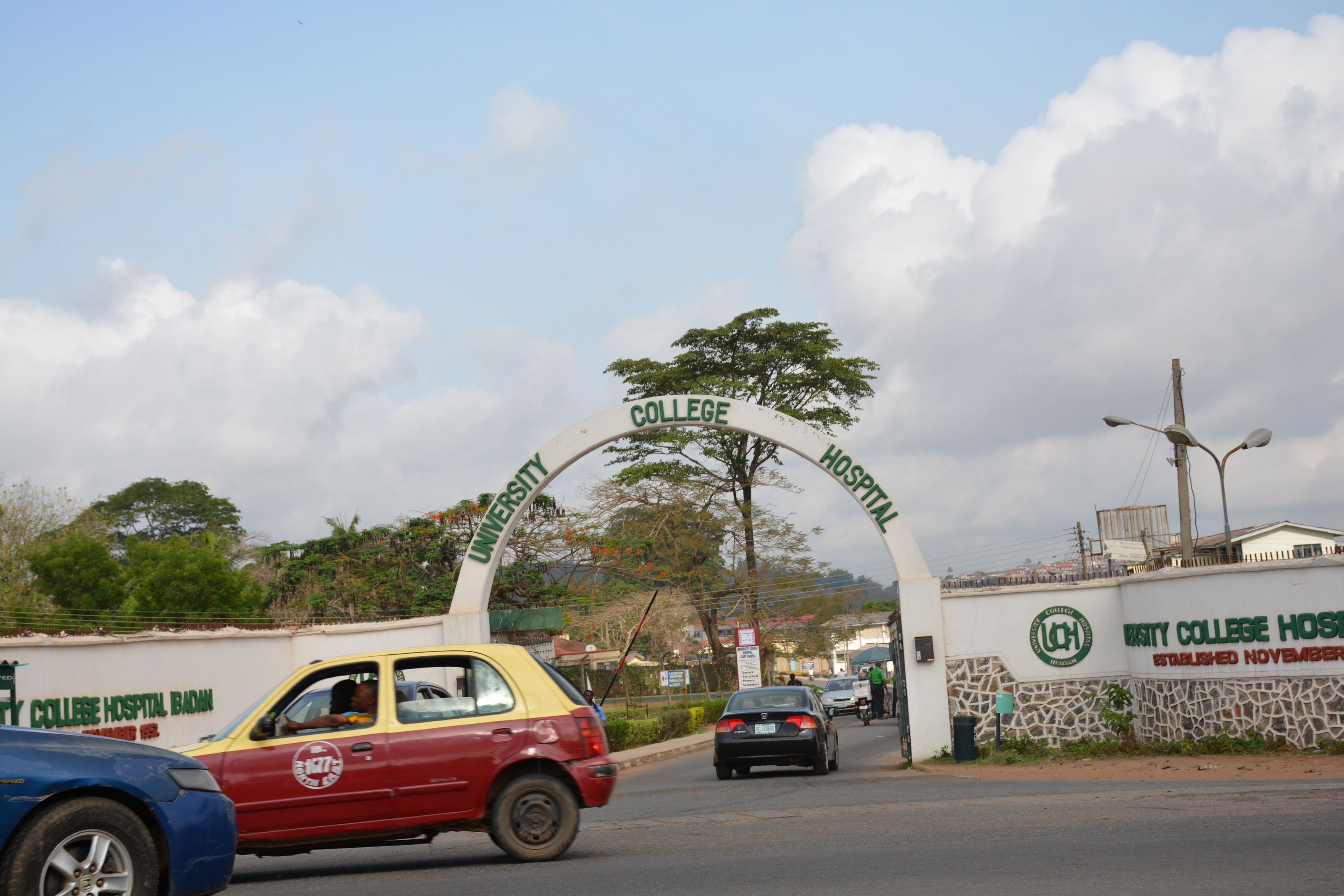
On his sick bed at the University College Hospital (UCH), this 54-year-old suffering from cancer of the anus cuts a frustrated figure. Since relocating to UCH in February (and this is March), he has taken in five pints of blood — in addition to seven at LUTH. And he has suffered. Each time he tries to talk, he finds that the strength left in him isn’t up to it. Then he resorts to tears. “I know I will get well,” he says intermittently, “and when I get well…”
His wife always cuts in: “Relax, honey; you will be fine.” She is his spokesman now. Not just that, his number-one caregiver, his manager, his comforter, his pillar. Another classic example of how listless life would be without love — how, without love, hospitals would be faster pathways to the graveyard.
“He was rejected at LASUTH because there was no bed space,” the undercover oncologist and journalist, who had found their way into UCH through the backdoor, overhear his wife say to a friend on the phone.
Even at LUTH, there was no bed space. But seeing how badly he needed to be admitted, the doctors took the difficult decision of searching round the ward to see who could be discharged. Finally, they found someone whose condition they thought was the least critical, and sent him home; but ordinarily, that patient would have remained on admission.
That admission at LUTH was short-lived, though. He needed radiotherapy and was told the machine would “soon” be repaired, but the wait was becoming endless. Earlier, he had also waited on the radiotherapy machine at the University of Nigeria Teaching Hospital (UNTH), Ituku-Ozalla, Enugu, for more than a month, but was eventually told it was “bad”. No longer willing to take risks, he decided to try UCH. But there was still one problem: it was January but UCH’s radiotherapy machine was already booked till April! Luckily, after his wife called a doctor-friend of hers, they received an expedited appointment. They arrived UCH in February, after more than three months of rejection by LASUTH and waiting on UCH and UNTH.
And so, while Eko Hospital is profiting from a lack of radiotherapy machine at LUTH, UCH is smarting from it. At UCH, there is increased competition for the machine to the extent that non-UCH patients have no chance of going under its radiotherapy machine early enough unless they’re connected to the hospital’s hierarchy.
On his sickness, they have spent more than N2million — more than half of that due to the endless wait for the machine. “We spent a lot of money on tests and drugs just to keep him in shape pending the readiness of the radiotherapy machine,” she says. “SO far, he’s had five radiotherapy sessions. Hopefully, he can get well soon.”
200 MILLION PEOPLE, FOUR RADIOTHERAPHY MACHINES
There are only four functioning radiotherapy machines all over the country to serve an estimated 200million Nigerians, yet the International Atomic Energy Agency (IAEA) recommendation is one RT machine per 1million people, meaning Nigeria should ordinarily have roughly 200 RT machines.
Of these four functioning machines in Nigeria, one is owned by Eko Hospital, a private hospital. This means that of the 20 federal teaching hospitals in the country, only three — UCH, Ahmadu Bello University Teaching Hospital Zaria and the National Hospital Abuja — currently have functional radiotherapy machines. The Usman Dan Fodio University Teaching Hospital Sokoto (under repairs), UNTH and LUTH have, but the machines have been down for varying long periods of time — that’s having like not having!
To put the situation in perspective, 17 of Nigeria’s 20 teaching hospitals cannot offer radiotherapy to cancer patients. Also, radiotherapy is unavailable in the entire South-South (comprising Akwa Ibom, Cross River, Bayelsa, Rivers, Delta and Edo states). Anyone diagnosed with cancer in this region must travel out of it — either to Enugu in the South-East, Lagos or Ibadan in the South-West, or Abuja in the North-Central. This trend is nothing new; there was a time in 2015 when only two radiotherapy machines were functioning in the whole country.
‘OLD SCHOOL’ RT MACHINES

Painfully, of the four radiotherapy machines available all over Nigeria, only one — National Hospital Abuja’s — is useful for curing cancer; all other three cannot. They are only useful prolonging a patient’s life; more like ‘you’re going to die anyway but let’s try not to make you die too soon’.
So explains Runcie C. W. Chidiebe, a cancer control advocate and Executive Director, Project Pink Blue.
“The radiotherapy machines at Zaria and Eko hospital are cobalt machines,” Chidiebe moans.
“I have interacted with so many medical physicists, clinical oncologists and radiation oncologists, and they will tell you that the beam produced by cobalt radiotherapy machines is not sufficient to prevent spread or even ensure any treatment or therapy; it is just good for palliative care only — that is the situation whereby you’re no longer trying to achieve cure but just to prolong the patient’s life.”
Chidiebe was stunned to find out during a recent visit to Texas Oncology in Sherman, in US, that just one centre had two radiotherapy machines — one variam, the other linac accelerator — serving 100,000 people.
“None was cobalt!” he exclaims. “These are the newest machines that produce sufficient beams that can really contain the cancer and prevent it from spreading to other vital organs.”
THE RADIOTHERAPY HUSSLE IS REAL
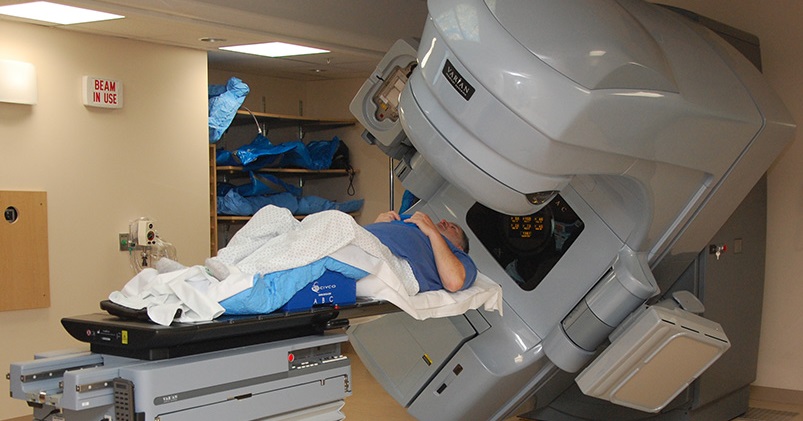
An expected consequence of the scarcity of RT machine is the huge competition for sessions in the three hospitals where the service is available. In those hospitals, an appointment is extremely difficult to secure, and officials try their best not to offer guarantees on the stability of their RT machines.
“The machine is working,” a UCH official said on the phone when asked for how soon an appointment could be booked, before quickly adding emphatically: “as of today!”
A contact in the radiotherapy department was supplied, and, although the doctor at the other end hesitated to pin a date for a patient that hadn’t been physically examined, he eventually said: “If the patient comes and we discover that it is not an emergency, he cannot get a RT appointment before July.” That is four months of offering the cancer unfettered access to spread!
FINANCING FOR ONCOLOGY MUST IMPROVE

So, what can be done to bolster the quality of treatment available to cancer patients, particularly in terms of access to RT?
“Most of the RT machines break down intermittently,” says Chidiebe. “Some don’t even work up to one month. It takes months to get money out for maintenance, but cancer doesn’t wait; it keeps spreading. We have refused every year to invest in cancer control. Financing for oncology and radiotherapy is so poor; it has to be improved.”
Another step, he explains, is for government to buy the machine spare parts and keep them, instead of waiting for the machines to develop fault.
“As I speak to you, there is no bone scan working across the country. We have two bone scan centres — UCH and National Hospital — but the problem is that there are no reagents,” he says.
“Can you imagine? The machines are there but no reagents. Isn’t it shameful? The nuclear medicine guys have to travel to South Africa to get these things. The Nigeria Customs Service are not helping issues, too, with the way they frustrate you with their corrupt demands when you try to bring these machine in.”
WHERE IS THE MONEY???

The most expensive linac radiotherapy machines cost between of $750,000 and $1.5million (between N228 million and N456million, at the current CBN rate), excluding associated costs such as the vault that will house the system, treatment planning and oncology information system software, lasers, and other accessories.
However, only N55.6 billion was allocated to capital projects in the ministry of in the 2017 budget. In 2016, it was N28.7billion, N22.7billion in 2015, and N49.5billion in 2014. In 2017, a total of N4.01 billion was budgeted for all 20 teaching hospitals; it was N2.4billion in 2016, N1.8bn in 2015 and N9.3bn in 2014. That’s grossly inadequate, considering the enormous equipment deficiencies of those institutions, which perhaps explains why University of Port Harcourt Teaching Hospital, despite receiving the biggest share of the 2017 capital allocation (N492.8million), still doesn’t have a RT machine.
While the health sector is incontrovertibly underfunded, it would appear that the bigger problem is financial mismanagement, not under-funding. In the 2017 budget, N9 billion was specifically allotted to the purchase of radiotherapy machines for some teaching hospitals (and another N117 million was also budgeted for cancer-related issues).
Let’s make two unlikely assumptions: that the government purchases the most expensive linac RT machine in existence (N456million) and the associated costs are as expensive as the machine itself (another N456million). This would mean that at the very maximum, one RT machine would cost N912million. Therefore, the N9bn budget would have funded the purchase of nine radiotherapy machines.
But in 2017, the government bought only one RT machine — for the National Hospital! The question, then, is: where is the rest of the N8bn?
This was one of the many questions that would have been put forward to Isaac Adewole, a Professor of Gynaecology and Obstetrics and Minister of Health, and Osagie Ehanire, Minister of State for Health, but neither responded to the email and text message sent to them.
THE LONG-TERM SOLUTION
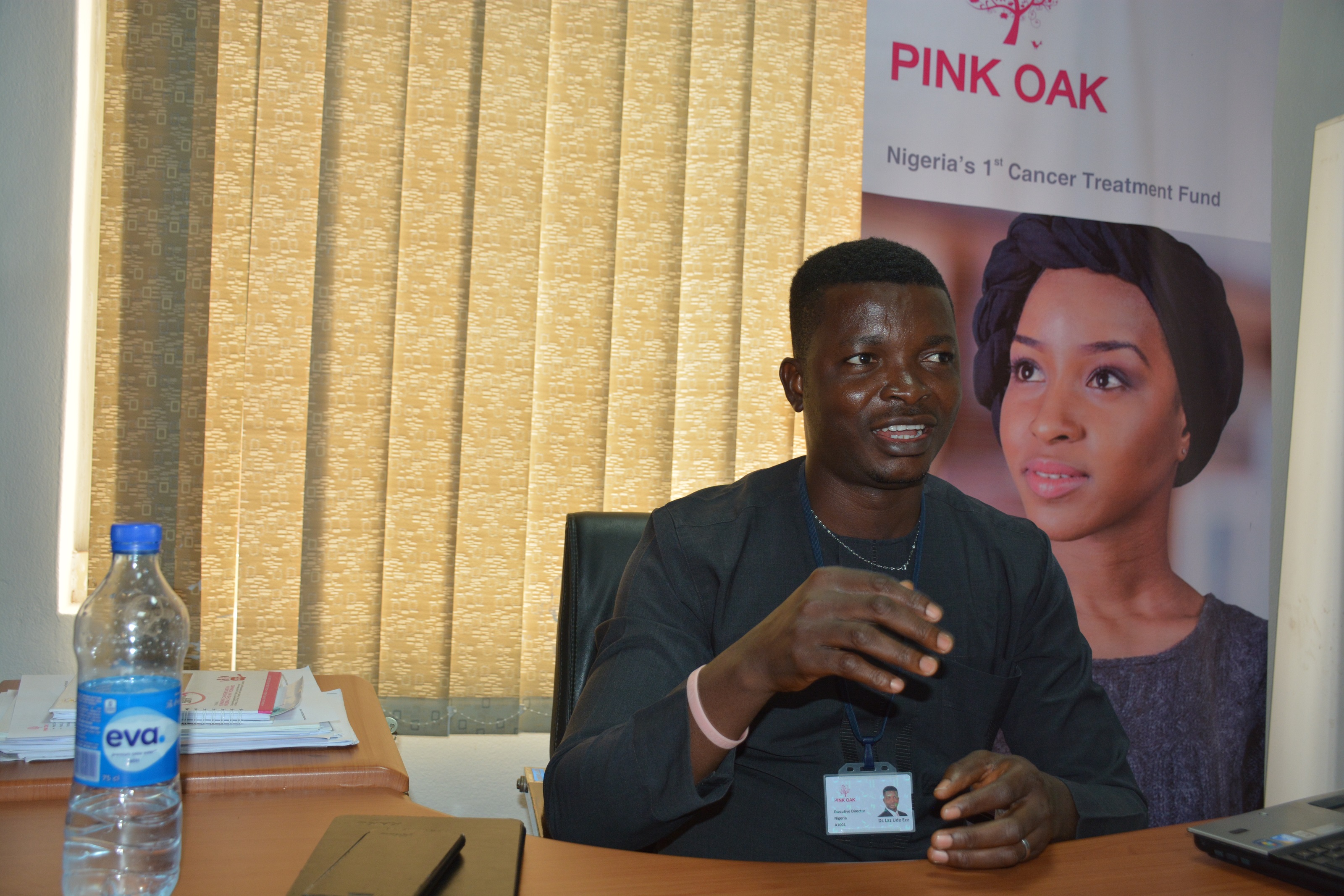
Dr. Laz Ude Eze, Executive Director of Pink Oak Cancer Trust — an NGO that raises funds to help cancer patients access better care — cannot understand why Nigeria can’t reproduce the success of even neighbouring African countries in making quality care available to cancer patients.
He recalls — and adds that “it is shameful” — that when all the radiotherapy machines in Nigeria broke down, Nigerians were travelling to Ghana for radiotherapy.
“These Ghanaian hospitals were not full-fledged government hospitals,” he says. “One was an initiative between the Swedish government and the Ghanaian government, bringing in some private investors. The hospitals where our presidents get treated abroad and all our public office holders run to with taxpayers’ money are not government hospitals. Most of them are private hospitals. So, why can’t we attract that level of investment here?”
The long-term solution to the cancer challenge, he is certain, is Universal Health Coverage (UHC), a mandatory health insurance for all Nigerians, enabling them to access the highest possible quality of healthcare without financial difficulty. He says the country’s decision-makers know this but the political will is lacking.
“That ‘without financial difficulty’ is a keyword. The health sector needs much more money than government currently allocates to it,” he says.
“With the UHC, everyone contributes to a medical fund. Everybody can’t get sick at the same time, therefore people with cancer can get treatment and don’t have to pay out of pocket; and if they have to, it will be something the person can afford.
“It doesn’t mean it has to be entirely free. But it has to be that no matter the level where the person operates, a patient will be able to afford healthcare. He doesn’t need to go bankrupt. You will not need to choose between feeding your family and paying for his health, or paying your child’s school fees and paying for your health. The opportunity cost will not need to be anything that is important to you. So it’s just like you want to buy coke — you know, that level — and you will not feel it. That’s the destination
“And it’s something that, if there’s political will to get it done, within two to three years, we can have it. We may say there is no money, but there is money for things that government considers important. If they don’t have money, they’d borrow to fund it. So, all the solution to this is for the government, at federal and state levels, to consider cancer as an important challenge.”
‘SOMEDAY IN THE FUTURE, WE’LL PAY FOR IT’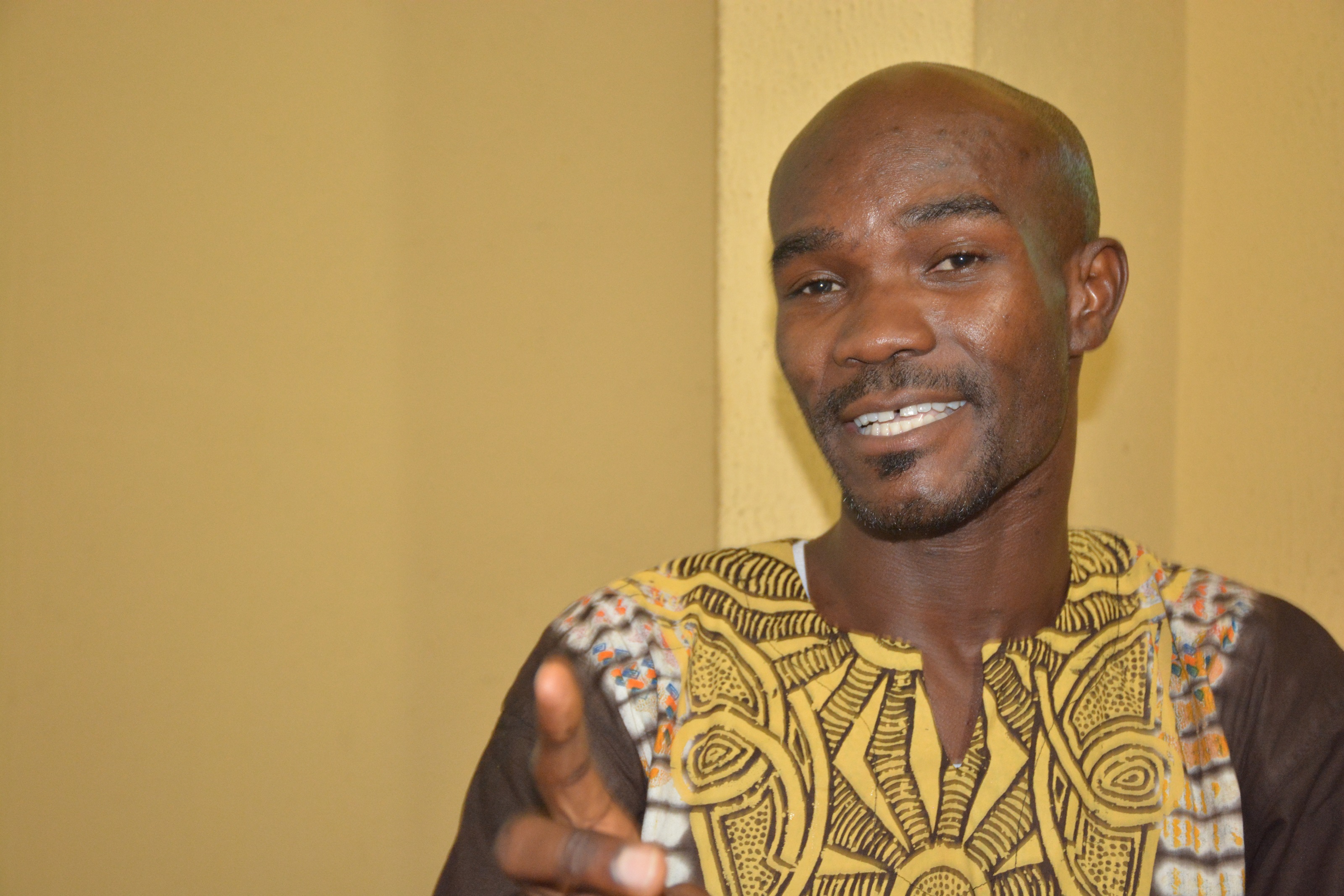
Would there be consequences if government continues ignoring the underwhelming quality of care available to cancer patients? Chidiebe says yes.
“It means people will continue to die unnecessarily, avoidably,” he says. “And you know the saddest thing? Most people who develop cancer are the aged whom we need to mentor the young ones. We’re raising a generation of youth lacking in mentoring by elders; and someday in the future, we will surely pay for it.”
This piece was originally published by the ICIR
1 comments
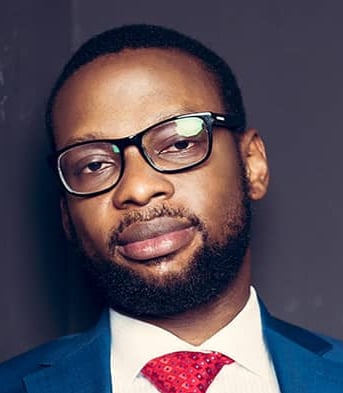

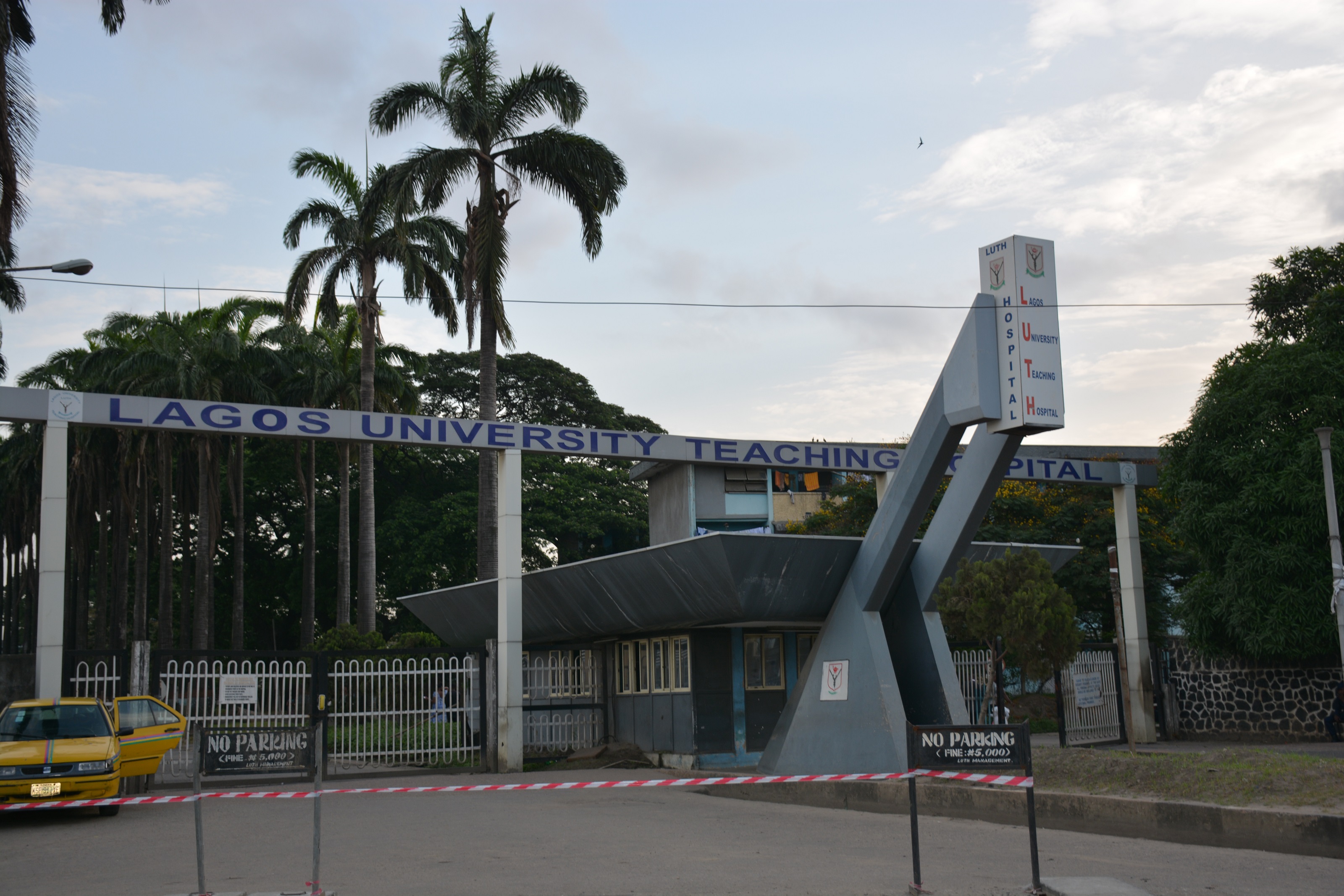

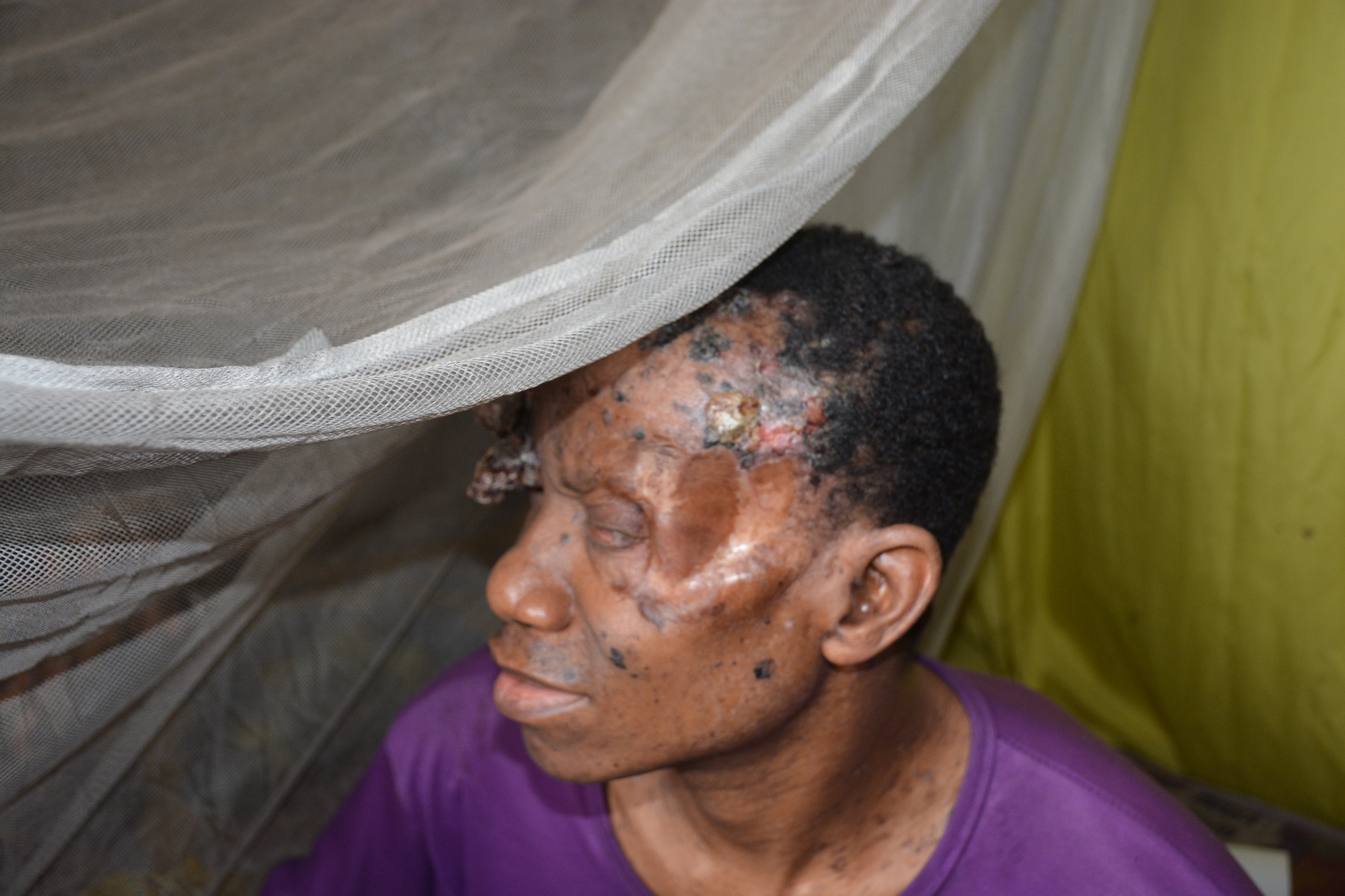
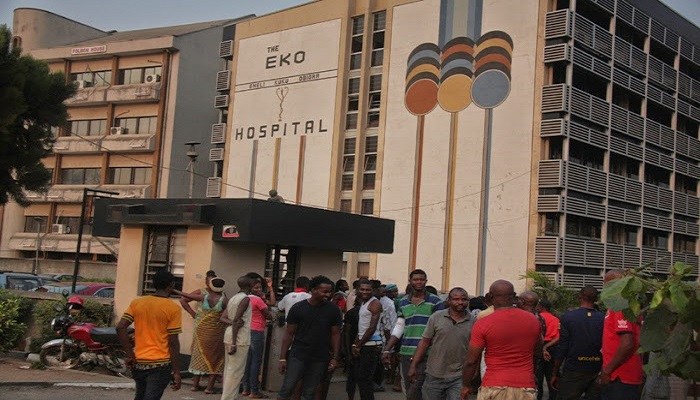


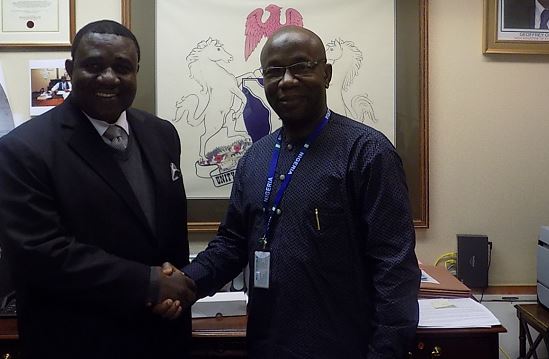
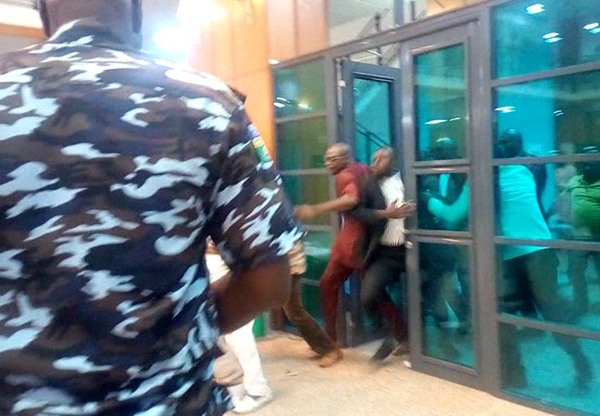

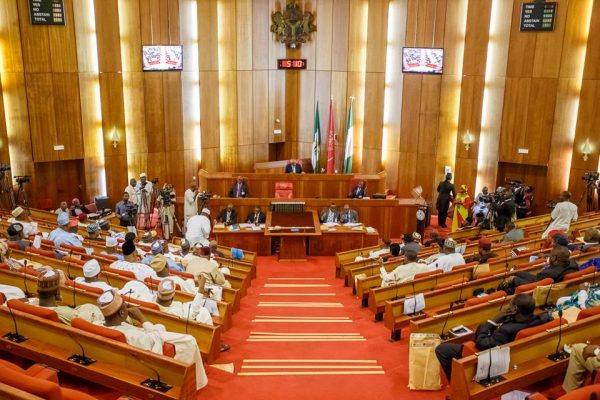
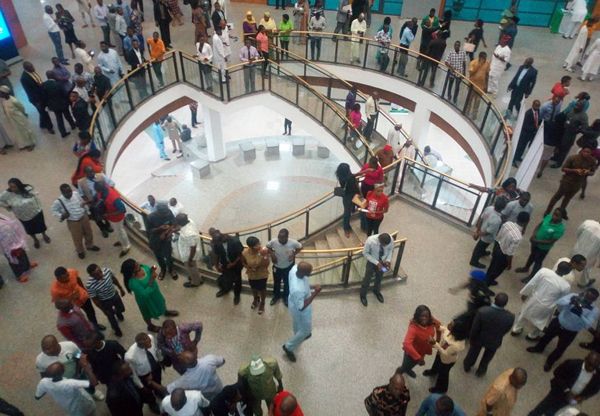
I can relate very well with the details in this write-up. February 24, 2016, I lost a very dear one to cancer(not for lack of love and care from family and loved ones) and agonisingly to the inadequacies of our health care system. But I ask, can this government claim to be ignorant of all that has been highlighted in this writeup? That would be hypocrisy. The government is in the know but all they are interested in and always interested in is how to come out tops in the next election. Even if they shift attention to the health care system, it is to boost their chances in the next election. This government has nothing to offer its citizenry…or you say I am wrong? Let them prove it!!! MTCHEW!!!